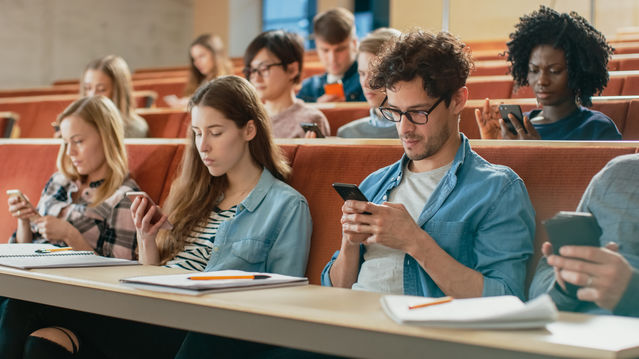Education
Does Technology in the Classroom Help or Harm Students?
New research reveals the drawbacks of electronic devices for learning.
Posted August 13, 2018
Of the countless emails I received from my students back when I was teaching college courses, one stands out in my memory. The student was following up on a point that had been made in class, and had sent me a related research study. I don't recall the point or the study, but I do remember noticing that she had sent it in the middle of our class discussion.

When I was first teaching, I allowed students to use their laptop computers for taking notes. I took pains at the beginning of each semester to explain that computers were to be used for note taking only, not for email, messaging, solitaire, and so forth. I wanted to protect the classroom from the constant distraction of our electronic devices, and wanted the students to be as fully present as possible.
But inevitably I would find students doing other things on their computers—giggling in the back row as they messaged a friend, checking email, looking at social media. Eventually I made a rule that students could not use computers during class unless they submitted a request for an exception (and of course if they had a documented accommodation). I expected that students would get more out of the class, and the class would get more out of them, if we minimized electronic distractions.
I was gratified to see research at the time that showed the benefits of taking notes by hand rather than on a computer ("The Pen Is Mightier Than the Keyboard"). The investigators found that pen-and-paper note taking led to better understanding of material; the authors suggested that since writing by hand is slower, it forces students to process information more deeply so they can distill the most important information to write down.
I recently returned to the topic of technology in the classroom in my interview with Dr. Raymond J. Pasi, an instructor at The George Washington University and a recently retired high school principal of 29 years. In his view, tools like PowerPoint have been overused, and don't necessarily promote engagement. (Full disclosure: I definitely relied excessively on PowerPoint slides when I was teaching.)
I know from having taking courses with him that Dr. Pasi was masterful at engaging students. He emphasized in our discussion how important it is to capture students' curiosity, and to draw them into collaborative exploration of a problem. As he noted, electronic slides aren't incompatible with that kind of engagement, but they can make it easier to zone out and simply copy bullet points.
A new study in Educational Psychology has revealed striking effects of electronic devices in the classroom. The experimenters permitted students to use their cell phones for some class sessions but not for others; analyses showed that students who used electronics in class did worse on midterm and final exams than students who did not.
The more surprising finding was that for class sessions in which electronics were allowed, students did worse on their subsequent exams even if they had not checked their devices in class. Simply having more screens in use had a detrimental effect on everyone. In explaining this finding, the authors note that learning tends to be most effective when it involves social interaction (the joint exploration that Dr. Pasi encouraged). They suggest that the use of electronic devices "changed the social character of the class from an occasion for joint attention to more like a group of individuals in a waiting room occasionally looking up."
How big was the effect? Scores were about 5 percent lower on average, with the largest effect for final exams. A five percent reduction in grade point average would translate into, for example, a 3.3 versus a 3.5. The authors note that the specifics of the study design very likely minimized the effect of divided attention on performance, such that the actual effect is probably even greater.
The full study may be found here: Dividing attention in the classroom reduces exam performance.
You can find my interview with Dr. Pasi here: Secondary education in the twenty-first century.
References
Glass, A. L., & Kang, M. (2018). Dividing attention in the classroom reduces exam performance. Educational Psychology. Advance online publication. doi:10.1080/01443410.2018.1489046
Mueller, P. A., & Oppenheimer, D. M. (2014). The pen is mightier than the keyboard: Advantages of longhand over laptop note taking. Psychological Science, 25, 1159-1168.




